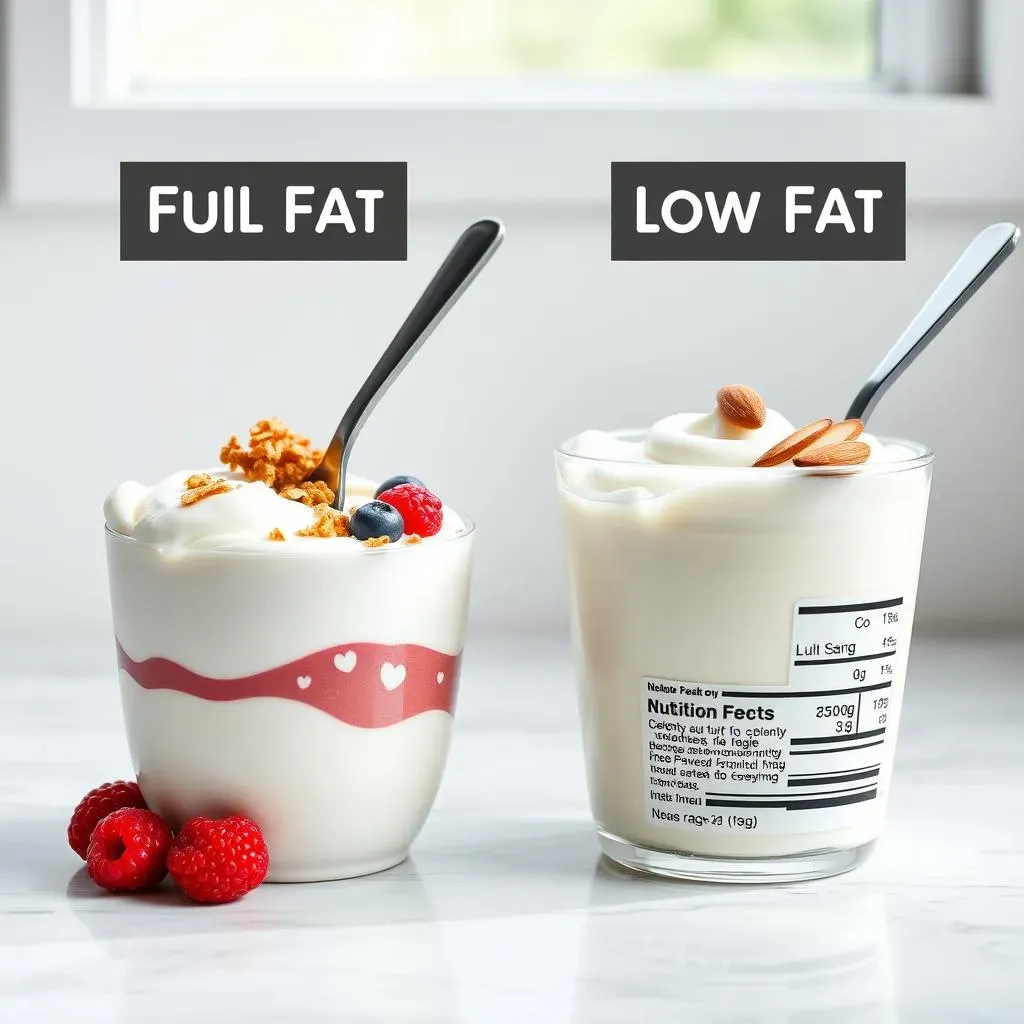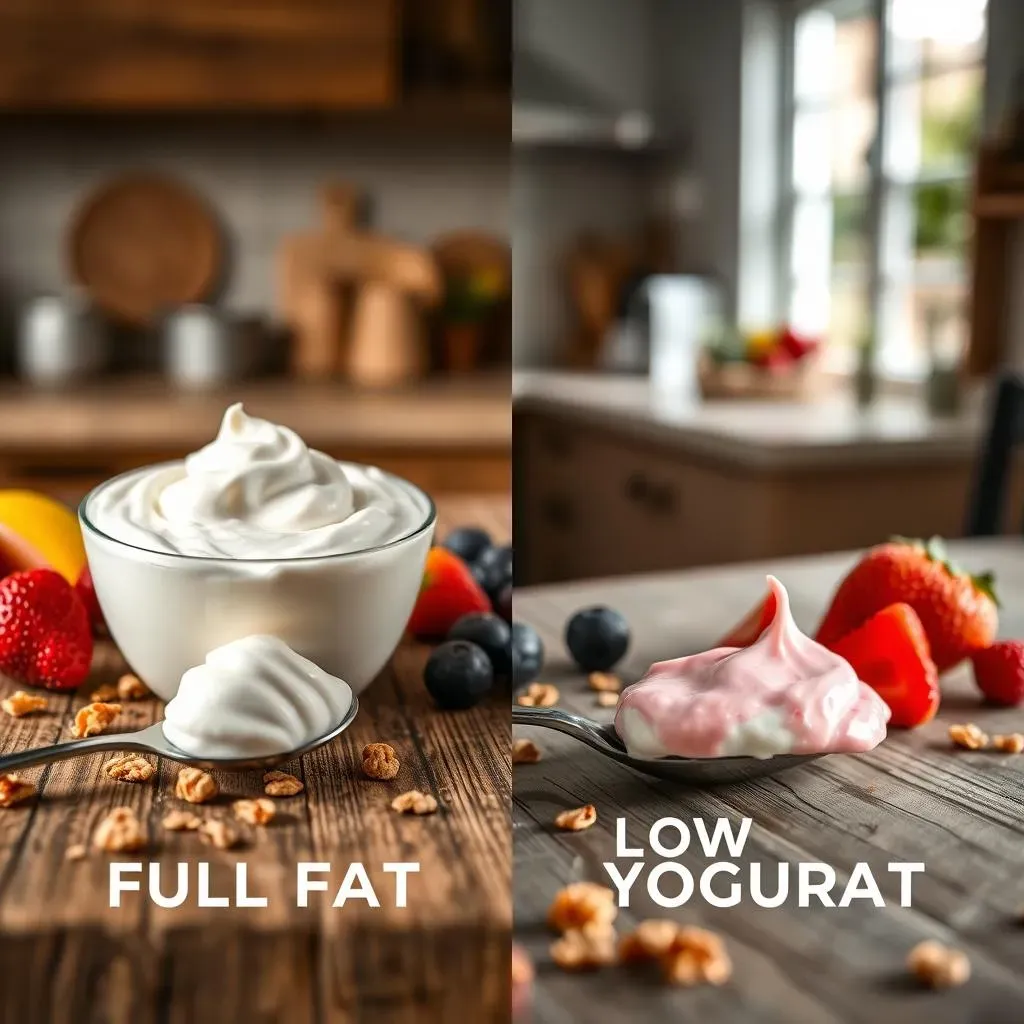Table of Contents
Standing in the dairy aisle, faced with a wall of yogurt cups, are you caught in the "full fat or low fat yogurt for weight loss" dilemma? It's a question that's sparked countless debates and left many scratching their heads. Is full-fat yogurt a forbidden indulgence, or does it hold a secret weapon for shedding pounds? Is low-fat yogurt the obvious choice, or are you missing out on crucial benefits? This isn't just about choosing a snack; it's about understanding how different types of yogurt impact your body, your cravings, and your overall weight loss journey. We'll break down the nutritional differences, explore the surprising advantages of full-fat options, and help you make an informed decision that aligns with your unique goals. Get ready to navigate the yogurt aisle with confidence and discover which type truly reigns supreme for effective weight management.
Full Fat or Low Fat Yogurt: Decoding the Dairy Aisle for Weight Loss

Full Fat or Low Fat Yogurt: Decoding the Dairy Aisle for Weight Loss
The Confusing World of Yogurt Labels
Let's face it, the yogurt aisle is a minefield. You're bombarded with labels screaming "low fat," "nonfat," "Greek," "probiotic," and a million other buzzwords. It's enough to make your head spin! But before you grab the first container that catches your eye, let's take a step back and understand what all these terms actually mean in the context of weight loss. The key is to look beyond the marketing hype and focus on the nutritional facts.
Think of it like this: yogurt is essentially milk that's been fermented. The type of milk used (whole, skim, etc.) directly impacts the fat content. Then, the straining process, particularly in Greek yogurt, affects the protein and carbohydrate levels. So, understanding these basic principles is crucial before we even start comparing full fat and low fat options.
Why Fat Content Matters (More Than You Think)
For years, we've been told that fat is the enemy, especially when it comes to weight loss. But the truth is, fat plays a vital role in our bodies. It helps us absorb nutrients, keeps us feeling full and satisfied, and even contributes to hormone production. The problem isn't fat itself, but rather the type of fat and the overall quantity we consume.
When it comes to yogurt, the fat content can significantly impact how it affects your appetite and cravings. Full-fat yogurt, with its higher fat content, tends to be more satiating than low-fat or nonfat varieties. This means you're likely to feel fuller for longer, which can help you eat less throughout the day. Moreover, the fat in yogurt can actually improve the absorption of certain vitamins, making it a more nutritious choice overall.
The Great Yogurt Debate: Nutritional Differences Unveiled

The Great Yogurt Debate: Nutritional Differences Unveiled
Calories, Macros, and the Nitty-Gritty
Alright, let's dive into the numbers. When you compare full-fat and low-fat yogurt, the most obvious difference is the calorie and macronutrient breakdown. Full-fat yogurt will naturally have more calories per serving due to its higher fat content. It also contains a different fatty acid profile, which we'll touch on later. Low-fat yogurt, on the other hand, cuts down on the fat and calories but often compensates by adding sugar or artificial sweeteners to enhance the flavor.
It's crucial to read the labels carefully! Don't assume that low-fat automatically equals healthy. Many low-fat yogurts are loaded with added sugars to make them more palatable, which can sabotage your weight loss efforts. The goal is to find a yogurt that's both nutritious and satisfying, without unnecessary additives.
Nutrient | Full-Fat Greek Yogurt (1 cup) | Low-Fat Greek Yogurt (1 cup) |
|---|---|---|
Calories | 220 | 130 |
Fat | 12g | 1.5g |
Protein | 20g | 20g |
Carbohydrates | 8g | 6g |
Sugar: The Sneaky Culprit
Here's where things get interesting. While full-fat yogurt might have more calories from fat, low-fat yogurt often contains significantly more sugar. Food manufacturers frequently add sugar to low-fat products to improve their taste and texture, as removing the fat can make them bland and less appealing. This added sugar can lead to blood sugar spikes and crashes, increased cravings, and ultimately, hinder your weight loss progress.
Always check the ingredient list and nutrition facts panel for added sugars. Look for yogurts with minimal or no added sugars, and opt for natural sweeteners like stevia or monk fruit if you need a touch of sweetness. Better yet, sweeten your yogurt yourself with fresh fruit or a drizzle of honey, so you have complete control over the sugar content.
Example: I was shocked when I compared a popular brand of full-fat Greek yogurt to its low-fat counterpart. The low-fat version had almost double the amount of added sugar! It's a classic example of how "low-fat" doesn't always mean "healthy."
Protein Power: A Key Player in Weight Loss
Regardless of whether you choose full-fat or low-fat yogurt, protein is a major win. Yogurt, especially Greek yogurt, is packed with protein, which is essential for building and repairing muscle tissue, keeping you feeling full, and boosting your metabolism. Protein is your ally in the weight loss game!
Both full-fat and low-fat Greek yogurt generally have similar protein content, so you're not necessarily sacrificing protein by choosing one over the other. However, the added fat in full-fat yogurt might contribute to a greater sense of satiety, making the protein even more effective at curbing your appetite.
Full Fat Yogurt: Satiety, Taste, and the Unexpected Benefits

Full Fat Yogurt: Satiety, Taste, and the Unexpected Benefits
The Satiety Factor: Feeling Full and Satisfied
Let's talk about satiety, that wonderful feeling of fullness that keeps you from reaching for unhealthy snacks an hour after you eat. Full-fat yogurt truly shines in this department. The higher fat content slows down digestion, keeping you feeling satisfied for longer. This can be a game-changer for weight loss, as it helps you naturally reduce your overall calorie intake without feeling deprived.
Think of it like this: fat is like a slow-burning fuel for your body. It provides sustained energy and helps stabilize blood sugar levels, preventing those dreaded energy crashes that often lead to cravings. Low-fat yogurt, on the other hand, is like a quick burst of energy that fades quickly, leaving you feeling hungry and searching for your next fix.
The Taste Advantage: A More Indulgent Experience
Let's be honest, taste matters! If you don't enjoy what you're eating, you're less likely to stick to your healthy eating plan in the long run. Full-fat yogurt simply tastes better. The fat adds richness and creaminess that low-fat yogurt often lacks. This makes it a more satisfying and enjoyable experience, which can help you resist the temptation to reach for less healthy options.
When food manufacturers remove fat from products, they often add sugar, salt, or artificial flavors to compensate for the loss of taste and texture. This can create a vicious cycle of unhealthy eating. By choosing full-fat yogurt, you're getting a naturally delicious product without the need for added junk.
Beyond Weight Loss: The Hidden Perks of Full-Fat Yogurt
The benefits of full-fat yogurt extend beyond weight loss. Studies suggest that consuming full-fat dairy products may actually be associated with a lower risk of type 2 diabetes. The fat in yogurt can also improve the absorption of fat-soluble vitamins like A, D, E, and K, which are essential for overall health.
Furthermore, full-fat yogurt contains beneficial fatty acids, such as conjugated linoleic acid (CLA), which has been linked to improved body composition and reduced inflammation. While more research is needed, these findings suggest that full-fat yogurt may offer a range of unexpected health benefits.
- Improved satiety and reduced cravings
- Enhanced taste and enjoyment
- Potential benefits for blood sugar control
- Better absorption of fat-soluble vitamins
- Source of beneficial fatty acids like CLA
Making the Right Choice: Tailoring Yogurt to Your Weight Loss Goals

Making the Right Choice: Tailoring Yogurt to Your Weight Loss Goals
Know Thyself: Understanding Your Dietary Needs
so we've laid out the facts, and hopefully, you're starting to see that the "full fat or low fat yogurt for weight loss" question isn't so black and white. The truth is, the best choice depends entirely on your individual dietary needs and preferences. Are you someone who struggles with cravings and portion control? Full-fat yogurt might be your secret weapon. Are you meticulously tracking your calories and trying to create a significant deficit? Low-fat yogurt could be a better fit.
Consider your overall diet. If you're already consuming plenty of healthy fats from sources like avocados, nuts, and olive oil, you might not need the extra fat from full-fat yogurt. On the other hand, if you're following a low-carb or ketogenic diet, full-fat yogurt can be a delicious and satisfying way to meet your fat requirements.
Practical Tips for Incorporating Yogurt into Your Diet
Now that you have a better understanding of the pros and cons of each type, let's talk about practical ways to incorporate yogurt into your weight loss plan. First and foremost, choose plain, unsweetened yogurt whenever possible. This gives you complete control over the ingredients and allows you to customize the flavor to your liking. Add fresh fruit, a sprinkle of cinnamon, or a drizzle of honey for a touch of sweetness.
Use yogurt as a versatile ingredient in your meals and snacks. Add it to smoothies for a protein boost, use it as a base for healthy dips and sauces, or swap it for sour cream or mayonnaise in your favorite recipes. Get creative and experiment with different flavors and combinations to keep things interesting!
- Choose plain, unsweetened yogurt to control sugar intake.
- Add fresh fruit, cinnamon, or a drizzle of honey for sweetness.
- Use yogurt in smoothies, dips, and sauces.
- Swap yogurt for sour cream or mayonnaise in recipes.
- Experiment with different flavors and combinations.
The Yogurt Verdict: Your Personalized Path to Weight Loss
Ultimately, the "full fat or low fat yogurt for weight loss" debate boils down to individual needs and preferences. There's no one-size-fits-all answer. By understanding the nutritional profiles, considering your satiety levels, and factoring in your overall dietary goals, you can confidently choose the yogurt that supports your weight loss journey. Whether you opt for the creamy indulgence of full-fat or the calorie-conscious approach of low-fat, remember that yogurt is a versatile and nutritious addition to a balanced diet. Listen to your body, experiment with different options, and enjoy the delicious benefits of this dairy powerhouse.
